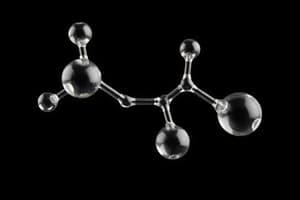Podcast
Questions and Answers
What is the general formula for alkenes?
What is the general formula for alkenes?
- CnH2n (correct)
- CnHn
- CnH2n+2
- CnH2n-2
What is the characteristic odor of alkenes?
What is the characteristic odor of alkenes?
- Neutral or odorless
- Sour or salty
- Pungent or sweet (correct)
- Bitter or sour
What type of reactions can alkenes undergo due to the presence of the double bond?
What type of reactions can alkenes undergo due to the presence of the double bond?
- Addition reactions (correct)
- Neutralization reactions
- Substitution reactions
- Elimination reactions
How are alkene names typically ended?
How are alkene names typically ended?
What type of isomerism can alkenes exhibit?
What type of isomerism can alkenes exhibit?
How can alkenes be prepared?
How can alkenes be prepared?
Flashcards are hidden until you start studying
Study Notes
Alkene Definition
- An alkene is a type of unsaturated hydrocarbon that contains one or more carbon-carbon double bonds.
- General formula: CnH2n
- Also known as olefins
Physical Properties
- Alkenes are generally colorless, volatile, and flammable liquids or gases
- They have a characteristic sweet or pungent odor
- Boiling points and melting points increase with increasing molecular weight
- Solubility: generally insoluble in water, but soluble in organic solvents
Chemical Properties
- Alkenes are reactive due to the presence of the double bond
- They can undergo addition reactions, such as:
- Electrophilic addition (e.g. hydrogenation, halogenation)
- Nucleophilic addition (e.g. hydrolysis, oxidation)
- They can also undergo polymerization reactions to form polymers
Nomenclature
- Alkene names end in "-ene"
- Numbering of the parent chain starts from the end that is closest to the double bond
- Substituents are named and numbered accordingly
- Example: 1-butene (CH₃CH₂CH=CH₂)
Isomerism
- Alkenes can exhibit structural isomerism (different bond connections) and stereoisomerism (same bond connections, but different 3D arrangements)
- Cis-trans isomerism is a type of stereoisomerism that occurs in alkenes with different substituents on the double bond
Preparation
- Alkenes can be prepared through:
- Dehydrohalogenation of alkyl halides
- Dehydration of alcohols
- Cracking of petroleum fractions
- Catalytic cracking of alkanes
Alkene Definition and Properties
- Alkenes are unsaturated hydrocarbons with one or more carbon-carbon double bonds.
- General formula: CnH2n.
- Also known as olefins.
Physical Properties
- Colorless, volatile, and flammable liquids or gases.
- Characteristic sweet or pungent odor.
- Boiling points and melting points increase with increasing molecular weight.
- Generally insoluble in water, but soluble in organic solvents.
Chemical Reactions
- Reactive due to the presence of the double bond.
- Undergo addition reactions, including:
- Electrophilic addition (e.g., hydrogenation, halogenation).
- Nucleophilic addition (e.g., hydrolysis, oxidation).
- Can undergo polymerization reactions to form polymers.
Nomenclature
- Alkene names end in "-ene".
- Numbering of the parent chain starts from the end closest to the double bond.
- Substituents are named and numbered accordingly.
- Example: 1-butene (CH₃CH₂CH=CH₂).
Isomerism
- Exhibit structural isomerism (different bond connections) and stereoisomerism (same bond connections, but different 3D arrangements).
- Cis-trans isomerism is a type of stereoisomerism that occurs in alkenes with different substituents on the double bond.
Preparation
- Can be prepared through:
- Dehydrohalogenation of alkyl halides.
- Dehydration of alcohols.
- Cracking of petroleum fractions.
- Catalytic cracking of alkanes.
Studying That Suits You
Use AI to generate personalized quizzes and flashcards to suit your learning preferences.




